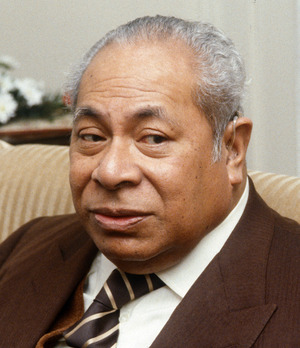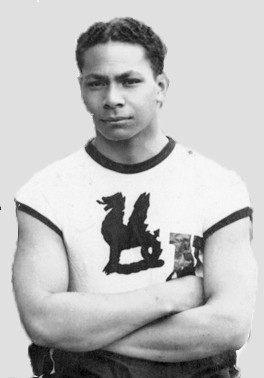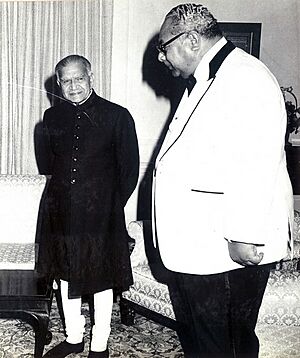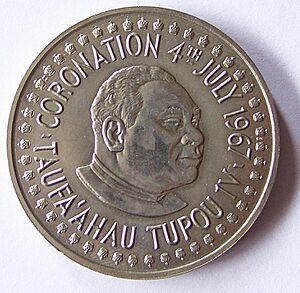Tāufaʻāhau Tupou IV facts for kids
Quick facts for kids Tāufaʻāhau Tupou IV |
|
|---|---|

Tāufaʻāhau Tupou in 1985
|
|
| King of Tonga | |
| Reign | 16 December 1965 – 10 September 2006 |
| Coronation | 4 July 1967 at Nukuʻalofa |
| Predecessor | Sālote Tupou III |
| Successor | George Tupou V |
| Prime Ministers |
See list
Prince Fatafehi Tu'ipelehake
Baron Siaosi Vaea Prince ʻAhoʻeitu ʻUnuakiʻotonga Tukuʻaho Feleti Sevele |
| 10th Prime Minister of Tonga | |
| In office | 12 December 1949 – 16 December 1965 |
| Monarch | Sālote Tupou III |
| Predecessor | Solomone Ula Ata |
| Successor | Prince Fatafehi Tu'ipelehake |
| Born | 4 July 1918 Royal Palace, Nuku'alofa, Tonga |
| Died | 10 September 2006 (aged 88) Auckland, New Zealand |
| Burial | Mala‘e Kula |
| Spouse | Halaevalu Mataʻaho ʻAhomeʻe |
| Issue | George Tupou V Princess Salote, Princess Royal Prince Fatafehi 'Alaivahamama'o Tuku'aho Tupou VI |
| House | Tupou |
| Father | Viliami Tungī Mailefihi |
| Mother | Queen Salote Tupou III of Tonga |
| Religion | Free Wesleyan Church |
Tāufaʻāhau Tupou IV was the King of Tonga from 1965 until he passed away in 2006. He was born on July 4, 1918, and his full name at birth was Siaosi Tāufaʻāhau Tupoulahi. He was known for being very tall and, for a time, the heaviest monarch in the world.
Contents
Early Life and Education
As a young boy, Siaosi Tāufaʻāhau Tupoulahi was given special traditional titles. First, he was called Tupoutoʻa in 1937. Later, he inherited the title Tungī from his father. He kept the Tungī title for the rest of his life.
He was very active in sports and was also a religious speaker when he was young. He went to school at Newington College in Australia. After that, he studied law at Sydney University.
Queen Sālote Tupou III, his mother, appointed him to important government roles. In 1943, he became the Minister of Education. The next year, he was the Minister of Health. By 1949, he became the Premier, which is like a prime minister. He continued to be a lay preacher for the Free Wesleyan Church throughout his life.
Becoming King
Tāufaʻāhau became the King of Tonga when his mother passed away in 1965. His official crowning ceremony, called a coronation, happened on July 4, 1967. This was also his 49th birthday! Many important people from other countries came to celebrate with him.
In the 1970s, King Tāufaʻāhau Tupou IV was known as the heaviest monarch in the world. He weighed about 209.5 kilograms (462 pounds) and was 196 centimeters (6 feet 5 inches) tall. When he visited Germany, special strong chairs were made just for him. He often took these chairs home as gifts. In the 1990s, he joined a national fitness program and lost a lot of weight.
As king, he had a lot of power and influence in Tonga's government. The country's nobles also held much power. In 2001, there was a situation involving his financial advisor. This led to people asking for the government to be more open and fair. The King had even jokingly appointed this advisor as Tonga's official court jester on April Fools' Day.
In 2005, government workers went on strike. The King's nephew helped to find a solution. A few weeks before he died, a group suggested changes to Tonga's laws.
Passing Away and Funeral
On August 15, 2006, the Prime Minister of Tonga announced that the King was very ill. He asked everyone in Tonga to pray for him. King Tāufaʻāhau Tupou IV passed away 26 days later, on September 10, 2006, in Auckland, New Zealand. He was 88 years old and had been king for almost 41 years.
His funeral was held on September 19, 2006, at Malaʻekula, the Royal cemetery in Tonga's capital, Nukuʻalofa. Thousands of Tongans came to say goodbye. Many important guests from other countries also attended, including the Crown Prince of Japan and the Prime Minister of New Zealand. The funeral combined Christian traditions with ancient Tongan customs.
King Tupou IV's reign of nearly 41 years made him one of the longest-serving rulers in the world at that time.
Family
King Tāufaʻāhau Tupou IV was married to Queen Halaevalu Mataʻaho ʻAhomeʻe. They had four children:
- King George Tupou V (1948–2012): He became king after his father passed away in 2006.
- Princess Royal Salote Mafileʻo Pilolevu Tuita (born 1951): She is known as Princess Pilolevu.
- Prince Fatafehi 'Alaivahamama'o Tuku'aho (1954–2004): He was later given the title Lord Māʻatu. He had four children.
- King Tupou VI (born 1959): He became king in 2012 after his older brother, King George Tupou V, passed away without children.
Honours
King Tāufaʻāhau Tupou IV received many awards and honours from Tonga and other countries. These awards recognized his importance and his work as a leader.
National Honours
- Knight Grand Cross with Collar of the Royal Order of Pouono
- Knight Grand Cross Of the Order of King George Tupou I
- Knight Grand Cross with Collar of the Order of the Crown of Tonga
- Recipient of the Royal Tongan Medal of Merit
- Recipient of the Tongan Red Cross Medal
Foreign Honours
- Grand Cross of the Order of the Legion of Honour (France)
- Grand Cross of the Order of Merit of the Federal Republic of Germany, Special Class (Germany)
- Knight Grand Cordon with Collar of the Order of the Chrysanthemum (Japan)
- Grand Cross of the Order of Brilliant Jade (Republic of China)
- Knight Grand Cross of the Order of St Michael and St George (United Kingdom)
- Knight Grand Cross of the Royal Victorian Order (United Kingdom)
Namesakes
- A building at Newington College in Australia is named Tonga House after him.
See also
 In Spanish: Taufa'ahau Tupou IV de Tonga para niños
In Spanish: Taufa'ahau Tupou IV de Tonga para niños
 | Madam C. J. Walker |
 | Janet Emerson Bashen |
 | Annie Turnbo Malone |
 | Maggie L. Walker |




